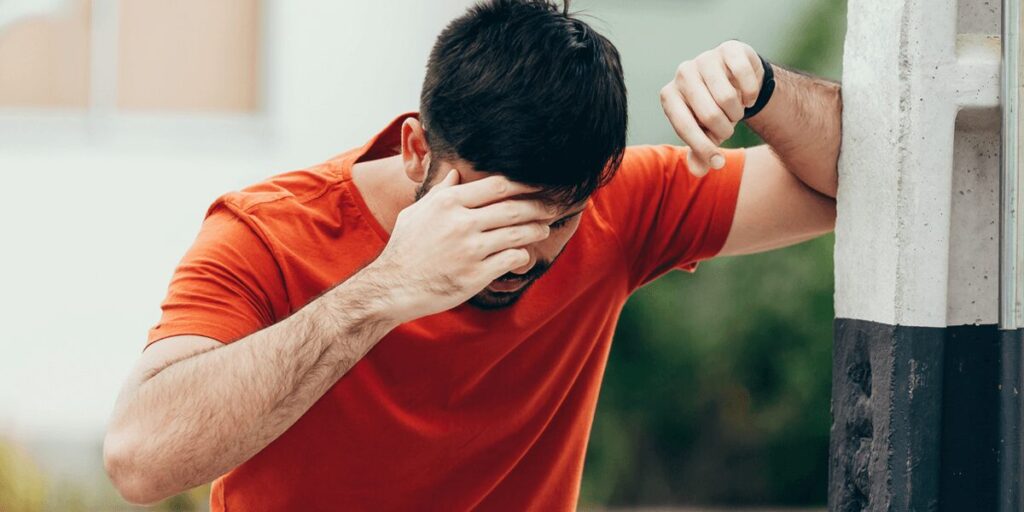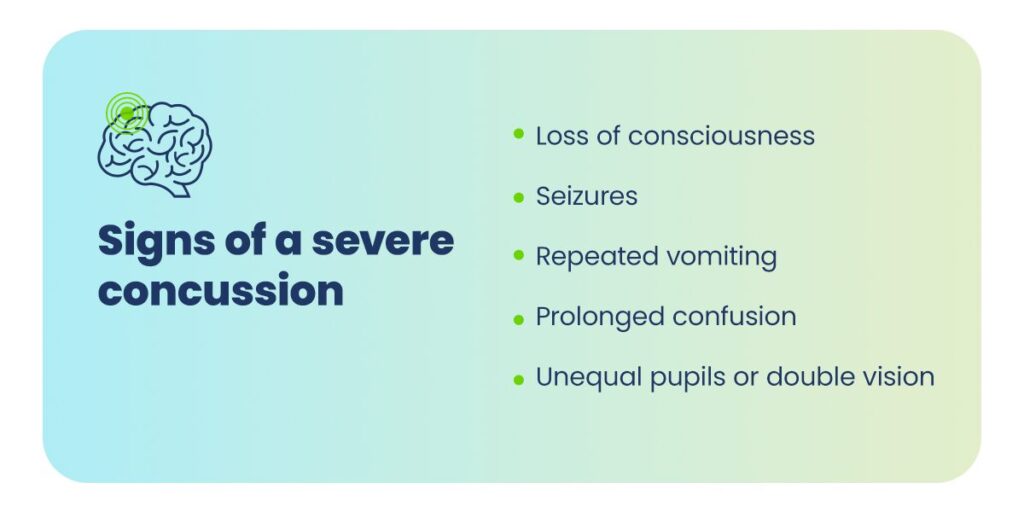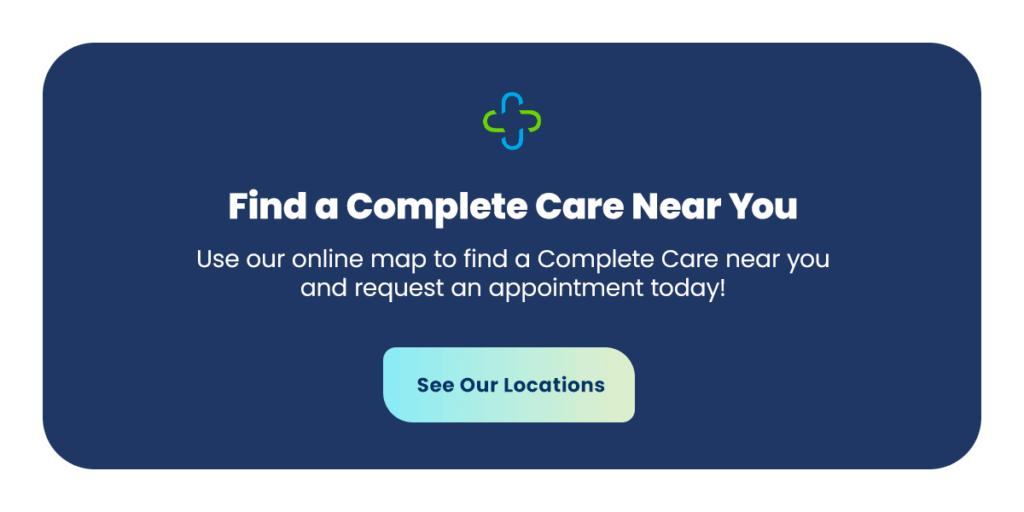
A concussion is a mild traumatic brain injury (TBI) that can happen when your body experiences an impact and your brain is shaken inside your head. You don’t have to hit your head to get a concussion. Whiplash, a fall or a hard impact on your body can be enough to cause one.
When your brain is shaken inside your head, the cells that make up your brain can stretch and even break. Until your body can repair itself, your brain may not work as well as usual. The more severe your concussion, the worse your symptoms will be and the longer it may take for your brain to recover.
Thankfully, most people fully recover from a concussion with time and plenty of rest. However, if you suspect you have a concussion, it’s important to see a doctor for diagnosis and treatment. With the right care, you can recover more quickly and avoid further damage to your brain.
If you suspect you have a concussion, you should see a doctor regardless of its severity. In most cases, a concussion will resolve itself with enough time and rest. However, severe concussions can lead to further damage without the right treatment. Signs of a severe concussion include:
The longer your symptoms last, the more serious your concussion is. If you’re unsure about the severity, it’s a good idea to see a medical professional for an official diagnosis. Knowing your concussion’s severity can also help you make the right choices for recovery.
Here’s more about the different degrees of concussions and their symptoms.

Different levels of concussions correspond with how much your brain was damaged during an impact. By checking your symptoms, you can get an idea of how serious your concussion is. Understanding the levels of severity of concussions can help you respond appropriately and get the treatment you need to heal. Below are three grades of concussions and their symptoms.
A grade 1 concussion is also called a minor concussion. People who experience a grade 1 concussion often feel slightly dazed but don’t lose consciousness. Common symptoms of a grade 1 concussion include:
Concussions can also disrupt your sleep, either making it difficult to fall asleep or causing you to feel extremely sleepy. With time, these symptoms should resolve themselves. Try to follow a normal sleep schedule and make your bedroom as relaxing as possible so it’s easier to fall asleep.
This type is slightly more serious than a grade 1 concussion. Grade 2 concussions have all the same symptoms, including headache, nausea and difficulty concentrating. However, additional symptoms of a grade 2 concussion include:
With a grade 2 concussion, you may experience a brief loss of consciousness. Symptoms last longer and are generally worse than grade 1 concussion symptoms. It will take your brain longer to recover from a grade 2 concussion, meaning you need to rest and avoid mental or physical stimulation until your neural pathways can heal.
If you experience a grade 3 concussion, you will lose consciousness after impact. The amount of time you are unconscious signals how serious the concussion is. Once you regain consciousness, you may experience all the symptoms of a grade 1 or grade 2 concussion.
Additional symptoms of a grade 3 concussion include:
Grade 3 concussions are severe, affecting more of your brain and restricting your body’s normal functions. With this level of damage, it’s essential to see a doctor. They can prescribe the appropriate treatments to prevent further damage and help you heal.
Several factors determine whether you have a mild versus a severe concussion, including:
If you’ve had a concussion before, your symptoms may be worse and your brain may take longer to heal. Young children whose brains are still developing may also experience more damage than adults in a similar situation. Remember that regardless of your symptoms, you should always see a doctor after a concussion. Your brain health is not something to take lightly!
On average, people younger than 18 recover from a concussion in 30 days, while a recovery period of 14 days is typical for individuals older than 18.
Of course, recovery time depends on the severity of your concussion. In general, grade 3 concussions take longer to heal than grade 1 concussions. However, even a minor concussion takes time to heal. Early treatment and plenty of rest can help you recover more quickly.
Because you use your brain for everything, the healing process can be frustrating. Your doctor may advise you to avoid physical activity, like playing sports, and mental activity like watching TV or reading. Although it may be boring, doing nothing is just what your brain needs to heal neural connections and start functioning at its best again.
Additional treatments that can help you recover after a concussion include:
For headache relief after a concussion, you can take over-the-counter medications like acetaminophen. However, you should avoid NSAIDs like ibuprofen and aspirin due to bleeding risks. Talk to your doctor if you have questions about which medication is safe to take after a concussion.
At Complete Care, we offer integrative injury care in Florida. When you visit one of our locations, you’ll find everything you need to recover from an accident — from imaging services to chiropractic neurology and chiropractic care.
Complete Care’s medical professionals have been offering injury care services since 2012, and we’ve helped thousands of people recover from work and auto accidents. Our clinics are designed for patient-first care, offering walk-ins, same-day appointments and telehealth services. You can find our clinics across Central Florida.

Have you experienced a concussion as a result of a recent accident? Now is the time to reach out for professional help. At Complete Care, we can help you with everything from diagnosis to treatment. Our medical professionals are equipped to complete brain scans, assess your symptoms and provide rehab treatment like chiropractic care.
Don’t dismiss concussion symptoms — see a medical professional after an accident so you can avoid further damage. Your brain health matters, and early treatment can make a difference in your recovery. Use our online map to find a Complete Care near you and request an appointment today!
The information provided on this website does not, and is not intended to, constitute legal advice; instead, all information, content, and materials available on this site are for general informational purposes only. Information on this website may not constitute the most up-to-date legal or other information. This website contains links to other third-party websites. Such links are only for the convenience of the reader, user or browser.